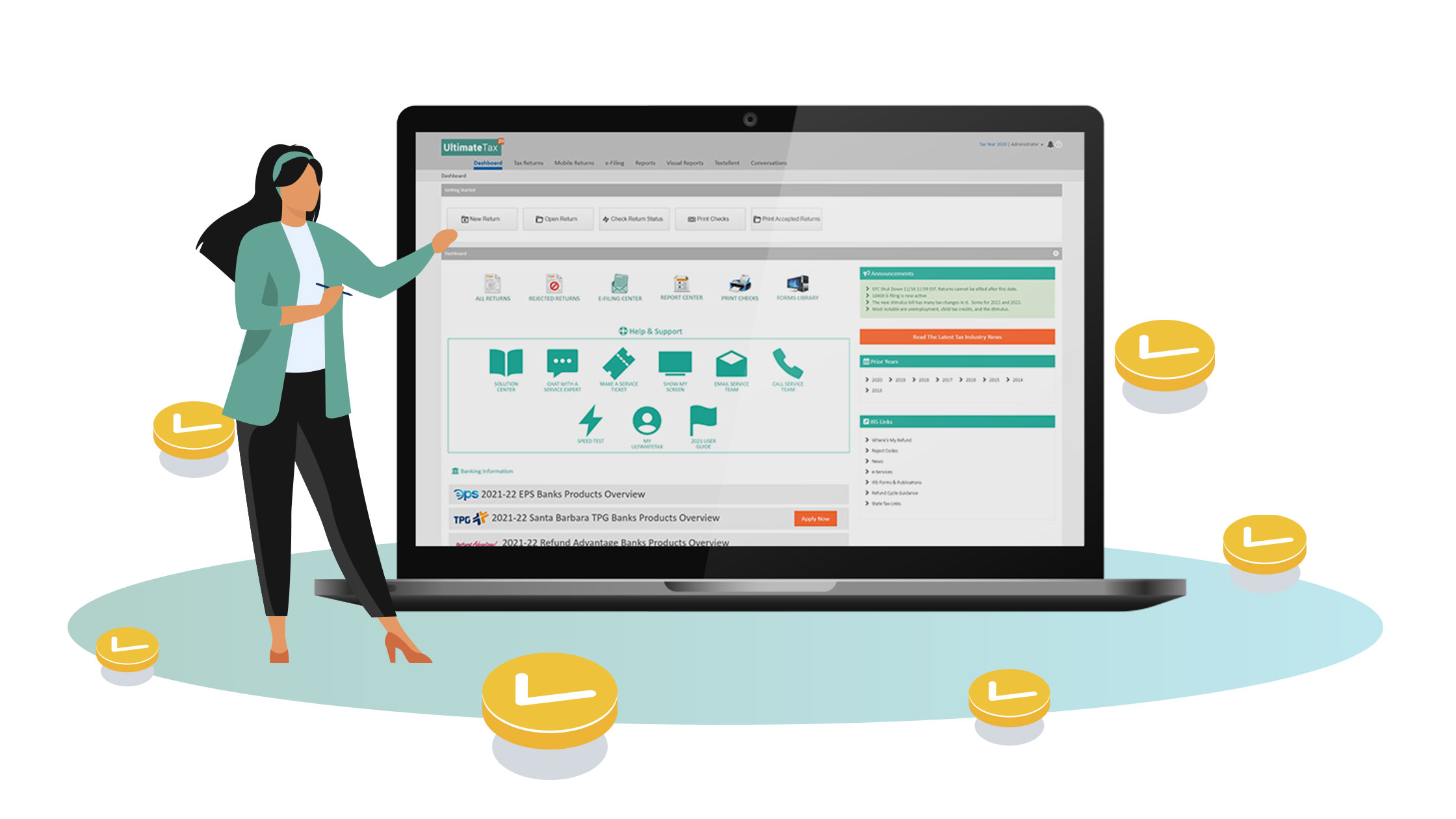Tax season can be stressful. Between managing your tax return, the ever-changing tax laws, and preparing your taxes for each new year, it can be daunting to tackle as a small business owner. Luckily, starting your own business can help you manage these challenges and more.
In addition to being your boss and having control over your time, activities, and finances, running a small business outside of an accountant’s office can also streamline the process for those who are self-employed or operating a sole proprietorship. Starting your tax prep service will not only make accounting easier for you but also help boost your income as a self-employed individual or sole proprietor.
Read on for tips on how to start a tax prep business as well as advice on where to find potential clients, how much capital you need, and other considerations before diving in headfirst.
What is a Tax Preparer?
Tax preparation is the process of helping individuals and businesses with their taxes. Tax preparation services range from simple audits to comprehensive tax planning, so there are many options for those who want to prepare their taxes. Depending on your skills and expertise, you can also choose to specialize in a particular area, such as accounting, business formation, or payroll, to name a few.
While a tax preparer may be a certified public accountant (CPA), certified financial analyst (CFA), or other licensed professional, some tax preparers are not certified to help with specific tax issues. The services you provide and the qualifications you have will depend on the state in which you operate.
Moreover, you should check with the state tax authority to see what requirements are required to operate as a tax preparer in your state.
How to Start a Tax Preparation Business?
Before you start making tax returns, it’s important to consider the risks and costs of establishing a tax prep business. Depending on your location, tax season can be very busy, with many clients requiring your services. In busy seasons, you may find yourself plagued by overwhelmed clients who need your services but are unable to put aside the time for a simple tax return. If you expect to start a tax prep business, here’s a step-by-step guide.
Step 1: Research and Plan
For many entrepreneurs, this is the most important step before starting a tax prep business. You’ll want to conduct extensive research and investigate different opportunities to find the best way to approach this new business. In addition, it’s important to consider your personal goals, current situation, and needs for the new business.
You might want to open a tax prep service for various reasons like wanting to earn additional income, or you might have a strong desire to improve your skills and help others. Before jumping headfirst into starting a tax prep service, take some time to consider where your heart and soul lie when it comes to your new tax prep venture.
Your research can start with talking to others who are in the same business as you, reaching out to your local chamber of commerce, or reading online forums and discussion groups. You can also talk to accountants and tax professionals, who may have experience in running a tax prep service.
While this is important, it’s also important to remember that you are running a business—unless you are planning on opening your doors as a sole proprietor and doing everything yourself, you’ll likely want to reach out to potential clients (read on) and find a way to manage your schedule, book appointments, and generate revenue from your new venture.
Step 2: Establish a Legal entity
Before opening for business, you’ll want to consider forming a legal entity. This will serve as the legal owner of your business entity, ensuring the integrity and stability of your tax return and taxes owed.
For example, you can form your own limited liability company (LLC) or another type of business entity. Opening an LLC will give you more flexibility as well as protection from personal liability. This will also help protect your assets if a lawsuit is filed against your company.
You can also open a corporation if you have more financial experience and are looking for a more formal way to run your business.
Step 3: Seek Appropriate Licenses and Permits
Depending on your local regulations and the type of business you’re opening, you may need to seek licenses and permits. In addition, you’ll want to consider licensing your business entity, like an LLC or corporation, if your state requires it.
This can help protect your business by limiting who can take advantage of it. While it’s not required, it can also help ensure that you are licensed and insured to provide certain services. It can also serve as a deterrent to those who may wish to take advantage of your new business.
Step 4: Open a Business Bank Account
One of the biggest challenges with starting your own tax prep business is managing cash flow. You’ll need to pay employees, cover operational costs, and invest in the future of your business. However, these costs can easily offset the deductions and credits you receive with taxes owed.
If you’re hoping to generate income with your new venture, it’s crucial to manage your cash flow. Ideally, you’ll want to open a business bank account for the new business. This can help manage cash flow and make it easier to pay bills and deposit account payments.
Step 5: Create a Website
Before you officially open for business, you should have a website for your business. While you may have an existing website for your existing business, you’ll want to create a new website for your new tax prep service. A website is a great way to connect with potential clients and showcase your services and mission. It can also be used to track leads, collect payments, and stay organized.
Depending on your business model, you may also want to consider a website builder, which can help you quickly create a professional-looking website at an affordable price. It’s also important to think about the purpose of your website, which will help determine the content you include and whether you want to use a WordPress site or another type of content management system. If you want to target potential clients, it’s important to include information about your business and your services.
You can also use your website to promote your social media pages, video tutorials, and other content that can keep your audience engaged.
Step 6: Look for the Best Tax Preparation Software
Depending on your business model and goals, you may want to look into tax prep software, which will help you manage your books and workflow. You’ll want to look for software that’s easy to use, has a wide range of features, and integrate with most accounting software.
If you’re hoping to generate significant business, you’ll want to choose software that has a large customer base, like The Ultimate Tax. This is one of the most popular tax prep software companies, with thousands of users and reviews.
It’s one of the most inexpensive options and has a wide range of features, like an online chat support option, automatic tax calculation, and multiple user profiles to help save time for various family members. Depending on your business needs and budget, you may also want to consider other options like H&R Block, TaxAct, and others.
Step 7: Formulate Tax Preparation Packages
Depending on your geographic area and client base, you might want to conduct different services for your clients. For example, you may want to offer a basic service that focuses on basic returns and filing, or you may want to offer a more comprehensive package that covers complex returns and situations.
Depending on your client base and the geographic area, it can be beneficial to conduct different services for your clients. Depending on your client base and the geographic area, you may want to conduct different services for different clients.
For example, you may want to offer a more comprehensive package for clients in New York and a more basic service for clients in other areas.
Finding Potential Clients
Taking the first step is key to finding potential clients. You can start by reaching out to friends, family members, and associates who have recently filed their taxes. You can also try reaching out to people you know who have similar income and filing statuses as yourself.
You can also use social media sites like Facebook, LinkedIn, Twitter, and Instagram to reach out to people in your area who may be looking for a tax preparer or who may be interested in having their taxes done. Many professional organizations and community groups also have lists of members who are looking for a tax preparer.
You can also search online for a directory of local businesses and individuals who may be looking to have their taxes done.
Costs of Starting a Tax Prep Business
As with any business, costs will vary depending on your location and the type of business entity you choose. Costs for filing taxes will vary from state to state and can include registration fees, entity formation fees, and annual state taxes.
If you choose to incorporate, costs may also include a federal tax on excess profits tax (subject to change). The costs of starting a tax prep business will also vary depending either on existing facilities or the need for new ones.
Bottom line
Many self-employed individuals start a tax prep business to save time and manage the work associated with taxes. Whether you need to file your taxes or provide tax preparation services to others, a tax prep business can help you make more time for your business.
Once you start a tax prep business, it’s important to keep costs down and focus on core services. With dedication and perseverance, tax prep businesses can be profitable, but it may take some time to get established.





